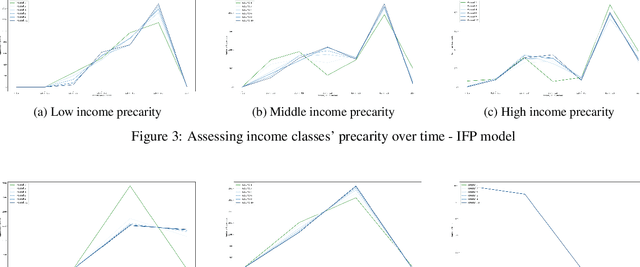Aravinda Kanchana Ruwanpathirana
Counting Hours, Counting Losses: The Toll of Unpredictable Work Schedules on Financial Security
Apr 10, 2025Abstract:Financial instability has become a significant issue in today's society. While research typically focuses on financial aspects, there is a tendency to overlook time-related aspects of unstable work schedules. The inability to rely on consistent work schedules leads to burnout, work-family conflicts, and financial shocks that directly impact workers' income and assets. Unforeseen fluctuations in earnings pose challenges in financial planning, affecting decisions on savings and spending and ultimately undermining individuals' long-term financial stability and well-being. This issue is particularly evident in sectors where workers experience frequently changing schedules without sufficient notice, including those in the food service and retail sectors, part-time and hourly workers, and individuals with lower incomes. These groups are already more financially vulnerable, and the unpredictable nature of their schedules exacerbates their financial fragility. Our objective is to understand how unforeseen fluctuations in earnings exacerbate financial fragility by investigating the extent to which individuals' financial management depends on their ability to anticipate and plan for the future. To address this question, we develop a simulation framework that models how individuals optimize utility amidst financial uncertainty and the imperative to avoid financial ruin. We employ online learning techniques, specifically adapting workers' consumption policies based on evolving information about their work schedules. With this framework, we show both theoretically and empirically how a worker's capacity to anticipate schedule changes enhances their long-term utility. Conversely, the inability to predict future events can worsen workers' instability. Moreover, our framework enables us to explore interventions to mitigate the problem of schedule uncertainty and evaluate their effectiveness.
Precarity: Modeling the Long Term Effects of Compounded Decisions on Individual Instability
Apr 24, 2021



Abstract:When it comes to studying the impacts of decision making, the research has been largely focused on examining the fairness of the decisions, the long-term effects of the decision pipelines, and utility-based perspectives considering both the decision-maker and the individuals. However, there has hardly been any focus on precarity which is the term that encapsulates the instability in people's lives. That is, a negative outcome can overspread to other decisions and measures of well-being. Studying precarity necessitates a shift in focus - from the point of view of the decision-maker to the perspective of the decision subject. This centering of the subject is an important direction that unlocks the importance of parting with aggregate measures to examine the long-term effects of decision making. To address this issue, in this paper, we propose a modeling framework that simulates the effects of compounded decision-making on precarity over time. Through our simulations, we are able to show the heterogeneity of precarity by the non-uniform ruinous aftereffects of negative decisions on different income classes of the underlying population and how policy interventions can help mitigate such effects.
 Add to Chrome
Add to Chrome Add to Firefox
Add to Firefox Add to Edge
Add to Edge